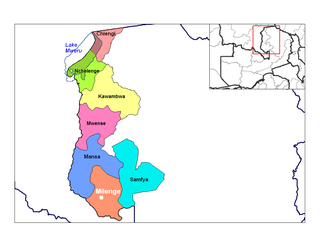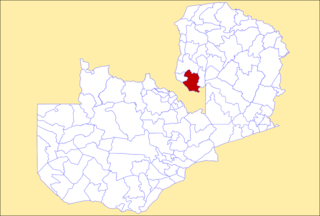 |
|---|
Milenge is a constituency of the National Assembly of Zambia. [1] It covers Milenge District in Luapula Province. Until 2016 it was named Chembe. [2]
 |
|---|
Milenge is a constituency of the National Assembly of Zambia. [1] It covers Milenge District in Luapula Province. Until 2016 it was named Chembe. [2]

Elections in Zambia take place within the framework of a multi-party democracy and a presidential system. The President and National Assembly are simultaneously elected for five-year terms.
Kasama is a town in the Northern Province of Zambia. It serves as the provincial capital and the headquarters of Kasama District.

The National Assembly is Zambia's unicameral legislative body. Between 1972 and 1990, Zambia was a one-party state with the United National Independence Party (UNIP) as the sole legal party.

The ten provinces of Zambia are divided into a total of 116 districts as of 2018.

Milenge Milenge is a 2010 Indian Hindi-language romantic drama film. Largely based on the 2001 film Serendipity, the film is directed by Satish Kaushik and stars Shahid Kapoor and Kareena Kapoor. Other members from the cast include Satish Shah, Aarti Chhabria, and Delnaaz Paul. The film received overwhelmingly negative reviews from critics and bombed at the box office.

Milenge is a settlement in the Luapula Province of Zambia, and headquarters of Milenge District. It consists of the boma housing the district council and offices, with a village of a few thousand people on the dirt road which runs from Chembe in the west.

Milenge District with headquarters at Milenge, Zambia is the most southerly district in the Luapula Province and was carved out of Mansa District. As of the 2000 Zambian Census, the district had a population of 28,790 people. It is rural and undeveloped, lacking roads and infrastructure. Its southern boundary is the Luapula River which divides it from DR Congo and the district lies roughly between the Chembe Ferry to Mansa road in the west and the Kapalala Ferry to Samfya road in the east. A single dirt road runs through the central part of the district from Chembe in the west following the north-west bank of the Lwela River, passing through Milenge Boma, Milambo and Lwela Mission, eventually connecting to the provincial capital, Mansa in the north-west. Most of the population of the district lives along the shallow valley of the Lwela River. The district is gently undulating flat plateau with an elevation of about 1200 m, consisting of woodland and wooded grassland interspersed with dambos.

The Speaker of the National Assembly of Zambia is a position established under Article 69(1) of the constitution. The Speaker is elected by members of the Assembly from anyone eligible to be elected to the National Assembly, but cannot be a sitting member.
Milenge may refer to:

Samfya District is located in Luapula Province, Zambia. The headquarters is at Samfya.

Nchelenge District is a district of Zambia, located in the Luapula Province. The capital lies at Nchelenge. As of the 2000 Zambian Census, the district had a population of 111,119 people.

General elections were held in Zambia on 19 December 1968 to elect the National Assembly and President. The first post-independence polls saw incumbent Kenneth Kaunda retain his post as president, whilst his United National Independence Party, the only party to field candidates in all 105 constituencies, won 81 of the 105 seats in the National Assembly. Voter turnout was 82.5% in the parliamentary election, but 87.1% in the presidential election.

General elections were held in Zambia on 5 December 1973. They were the first elections held since the country was formally declared a one-party state in August, with the United National Independence Party (UNIP) as the only legally permitted party. UNIP leader Kenneth Kaunda was automatically elected to a third five-year term as President, and was confirmed in office via a referendum in which 88.8% of voters approved his candidacy. UNIP also won all 125 seats in the National Assembly. Voter turnout was 39% of the 1,746,107 registered voters for the presidential election, and 33% for the National Assembly election.

Chembe is a constituency of the National Assembly of Zambia. It covers Chembe and Kundamfuma in Chembe District of Luapula Province, and was created in 2016 when the former Chembe constituency was renamed Milenge.

Nalolo is a constituency of the National Assembly of Zambia. It covers Nalolo District in Western Province.

Mulobezi is a constituency of the National Assembly of Zambia. It covers Mulobezi and surrounding areas in Mulobezi District of Western Province.

Magoye is a constituency of the National Assembly of Zambia. It covers the village of Magoye and surrounding areas in Mazabuka District of Southern Province.

Mangango is a constituency of the National Assembly of Zambia. It covers part of Kaoma District in Western Province.

Luena is a constituency of the National Assembly of Zambia. It covers Limulunga District in Western Province, including the town of Limulunga.